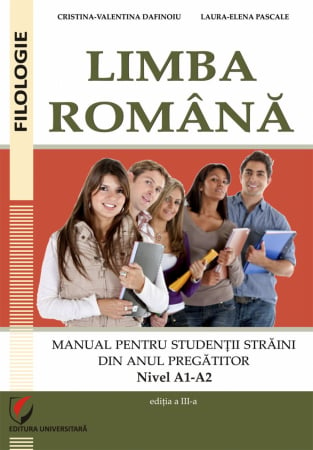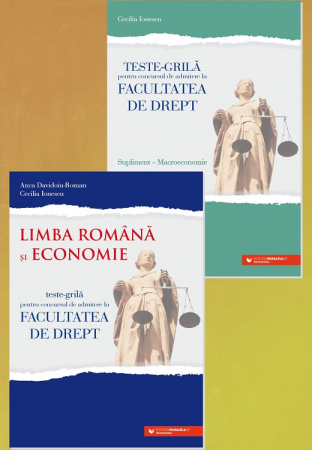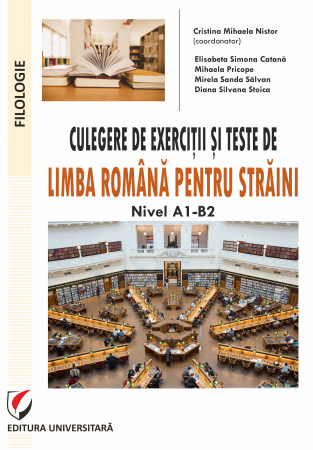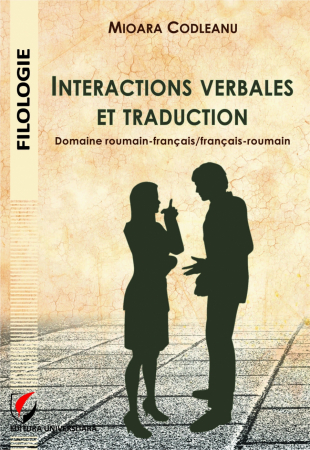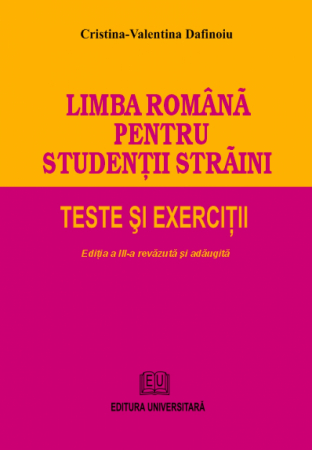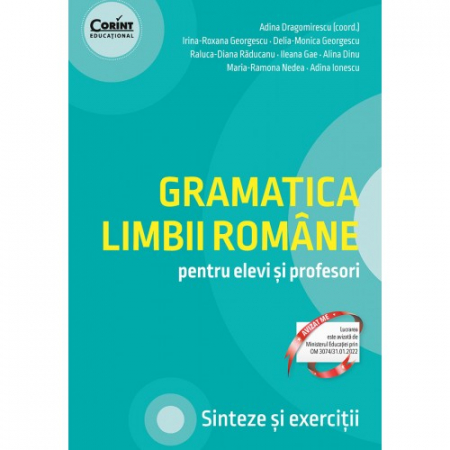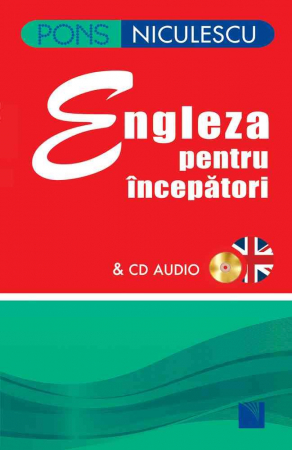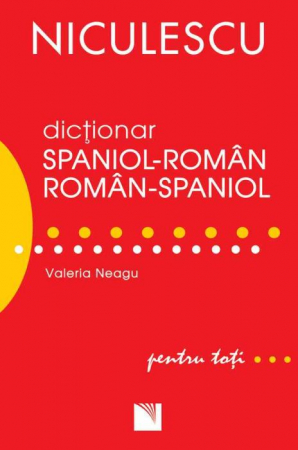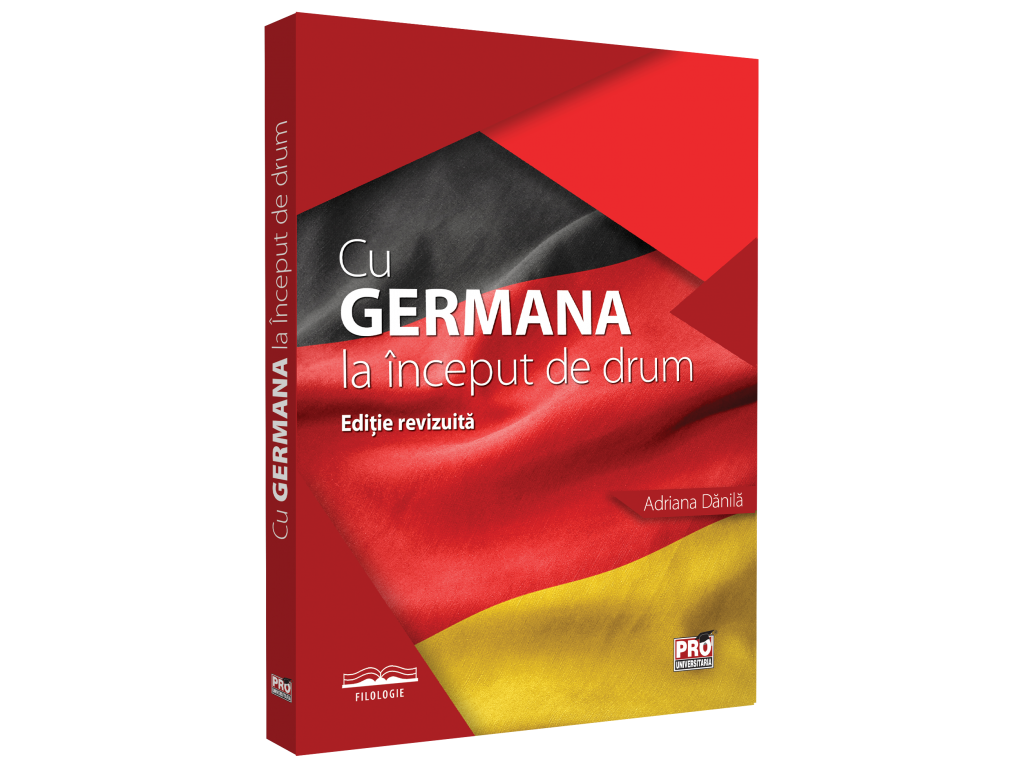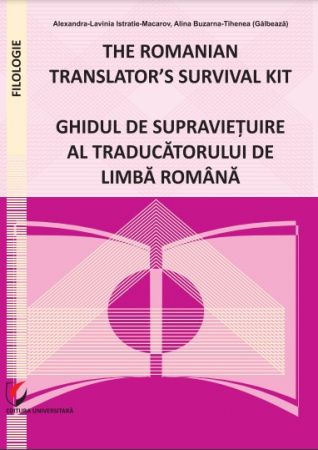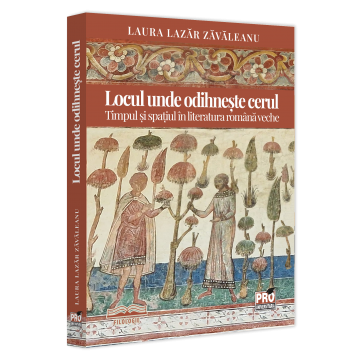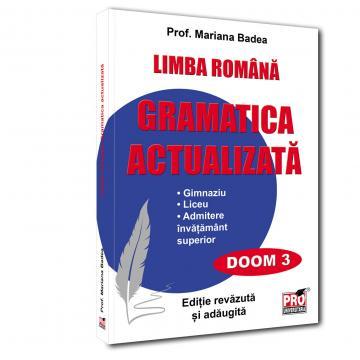Manuscript proposals: [email protected] / 0745 204 115 //// Tracking orders Individuals / Sales: 0745 200 357 / Orders Legal entities: 0721 722 783
6359.png) The electoral discourse in the current Romanian language. A cognitive-semantic approach - Monica Cezarina Ilie
The electoral discourse in the current Romanian language. A cognitive-semantic approach - Monica Cezarina Ilie
6359.png)
ISBN: 978-606-28-1406-9
DOI: https://doi.org/10.5682/9786062814069
Publisher year: 2022
Pages: 214
Publisher: Editura Universitară
Author: Monica Cezarina Ilie
Edition: I
Product Code:
9786062814069
Do you need help?
0745 200 357
- Description
- Download (1)
- Authors
- Content
- More details
- Reviews (0)
The work proposed by Monica Cezarina Obagiu Ilie deals with a fertile topic by its nature, because the electoral discourse, "species" of political discourse, offers unlimited field of linguistic and ideological analysis, in close connection with each other, from countless theoretical perspectives and by applying various practical grids. The novelty of the present approach consists in the application of the model of cognitive-discursive analysis - relatively well known in the philological field, in its “traditional” form - in a unique variant in the Romanian space of specialized research. It is about the electronically instrumentalized application, through a software created especially for the analysis of the discourse, namely, through the "Tropes" Program.
Of course, the author also starts from the older acquisitions of the word sciences and the chapters of the theoretical infrastructure - no less than three in number, as if to fear that readers will fail to understand the mechanisms of operation and interpretations offered by this cybernetic program - represents synthesized and well-integrated forays into the well-known modern fields of word science. First of all, the data of pragmalinguistics are processed, by adapting to the study subject here the contributions of a forerunner like Émile Benveniste and of the founder, John Langshaw Austin. These are superimposed on principles of Chomskyan-type linguistic generativism and complemented by data from American and European cognitivism (in the Brussels and Geneva school versions), and then on those from discourse analysis. This time, the perspective is philosophical, although the terms of reference remain the verbal structures, from words and phrases ‑ key, to statements and phrases with social ‑ political meanings and with connotative echoes interpretable in pragmatic key. More precisely, at the heart of these approaches is the analysis framework practiced by Michel Foucault.
All this constitutes, in the demonstration of Monica Obagiu Ilie, the basis on which the analysis grids from which the "Tropes" Program was born were built. Its authors, as well as the authors of the reference books that have shown its effectiveness, are rather psycholinguists and sociolinguists, starting with Rodolphe Ghiglione and his students, but the subject of study remains the same: semantic lexical system, morphological classes and categories, syntactic structures, with their logical ‑ formal basis and, last but not least, the pragmatic-stylistic meanings extracted from them. As usual, when a new method of research appears, what changes visibly is primarily metalanguage. Specialized terminology creates the impression of shifting the focus to other areas of human knowledge, as it speaks of "discursive formations", "universes", "intradiscursive aspect" and "interdiscursive languages".
Of course, the author also starts from the older acquisitions of the word sciences and the chapters of the theoretical infrastructure - no less than three in number, as if to fear that readers will fail to understand the mechanisms of operation and interpretations offered by this cybernetic program - represents synthesized and well-integrated forays into the well-known modern fields of word science. First of all, the data of pragmalinguistics are processed, by adapting to the study subject here the contributions of a forerunner like Émile Benveniste and of the founder, John Langshaw Austin. These are superimposed on principles of Chomskyan-type linguistic generativism and complemented by data from American and European cognitivism (in the Brussels and Geneva school versions), and then on those from discourse analysis. This time, the perspective is philosophical, although the terms of reference remain the verbal structures, from words and phrases ‑ key, to statements and phrases with social ‑ political meanings and with connotative echoes interpretable in pragmatic key. More precisely, at the heart of these approaches is the analysis framework practiced by Michel Foucault.
All this constitutes, in the demonstration of Monica Obagiu Ilie, the basis on which the analysis grids from which the "Tropes" Program was born were built. Its authors, as well as the authors of the reference books that have shown its effectiveness, are rather psycholinguists and sociolinguists, starting with Rodolphe Ghiglione and his students, but the subject of study remains the same: semantic lexical system, morphological classes and categories, syntactic structures, with their logical ‑ formal basis and, last but not least, the pragmatic-stylistic meanings extracted from them. As usual, when a new method of research appears, what changes visibly is primarily metalanguage. Specialized terminology creates the impression of shifting the focus to other areas of human knowledge, as it speaks of "discursive formations", "universes", "intradiscursive aspect" and "interdiscursive languages".
-
The electoral discourse in the current Romanian language. A cognitive-semantic approach
Download

MONICA CEZARINA ILIE attended the Letters department of the Faculty of Theology-Letters, Valahia University of Targoviste. After a Master's degree in philology, he completed his doctoral internship at Ovidius Constanta University, completed with a thesis on political-electoral discourse. He attended many postgraduate courses in professional development and personal development.
She participated in numerous scientific events, with works on the language of Romanian popular texts, on the didactic aspects of the Romanian language and literature and especially on written and oral communication from the perspective of confrontations on the political scene. He has published many of these papers in collective volumes and in academic journals of national and international circulation.
She is a teacher in pre-university education and mixes the activity at the department with that of political activist and with the executive functions in the local administration.
PREFACE (P. Gh. Barlea) / 7
INTRODUCTION / 12
1. Argument / 12
2. Research objectives / 13
3. Media discursive campaigns / 14
CHAPTER I
Conceptual landmarks / 19
1.1. Political communication / 19
1.2. Public opinion and communication structures / 30
1.3. The versatility of the concept of "discourse" / 36
1.3.1. Argumentation and persuasion / 36
1.3.2. From linguistics to discourse analysis / 46
1.3.3. Political discourse and mass media / 52
CHAPTER II EA OHL
The logical and linguistic bases of discourse generation / 62
2.1. Highlights of the enunciation theory / 62
2.2. Discursive formation / 69
2.3. Semiolinguistic perspective / 72
2.4. The impact of speech acts / 77
CHAPTER III
Cognitive ‑ discursive analysis - between syntax and semantics / 82
3.1. Computerized speech analysis / 82
3.2. Propositional Predictive Analysis (APP) / 83
3.3. Proposition Proposition Analysis (APD) / 86
3.4. Cognitive and Discursive Analysis (ACD) / 89
3.5. Computerization of analyzes: Tropes / 89
CHAPTER IV
Pragmatic structures in the "presidential" speech of 2019 / 101
4.1. The corpus of texts / 101
4.2. Candidates' speech / 105
4.2.1. The pre-campaign stage or "I decided to…" / 106
4.2.2. The first round or discursive "bursts" / 130
4.2.3. The results of the first round and the self-definition discourse / 160
4.2.4. The second round or the radicalization of discursive structures / 161
CONCLUSIONS / 171
BIBLIOGRAPHY / 176
ANNEX / 183
INTRODUCTION / 12
1. Argument / 12
2. Research objectives / 13
3. Media discursive campaigns / 14
CHAPTER I
Conceptual landmarks / 19
1.1. Political communication / 19
1.2. Public opinion and communication structures / 30
1.3. The versatility of the concept of "discourse" / 36
1.3.1. Argumentation and persuasion / 36
1.3.2. From linguistics to discourse analysis / 46
1.3.3. Political discourse and mass media / 52
CHAPTER II EA OHL
The logical and linguistic bases of discourse generation / 62
2.1. Highlights of the enunciation theory / 62
2.2. Discursive formation / 69
2.3. Semiolinguistic perspective / 72
2.4. The impact of speech acts / 77
CHAPTER III
Cognitive ‑ discursive analysis - between syntax and semantics / 82
3.1. Computerized speech analysis / 82
3.2. Propositional Predictive Analysis (APP) / 83
3.3. Proposition Proposition Analysis (APD) / 86
3.4. Cognitive and Discursive Analysis (ACD) / 89
3.5. Computerization of analyzes: Tropes / 89
CHAPTER IV
Pragmatic structures in the "presidential" speech of 2019 / 101
4.1. The corpus of texts / 101
4.2. Candidates' speech / 105
4.2.1. The pre-campaign stage or "I decided to…" / 106
4.2.2. The first round or discursive "bursts" / 130
4.2.3. The results of the first round and the self-definition discourse / 160
4.2.4. The second round or the radicalization of discursive structures / 161
CONCLUSIONS / 171
BIBLIOGRAPHY / 176
ANNEX / 183
The work proposed by Monica Cezarina Obagiu Ilie deals with a fertile topic by its nature, because the electoral discourse, "species" of political discourse, offers unlimited field of linguistic and ideological analysis, in close connection with each other, from countless theoretical perspectives and by applying various practical grids. The novelty of the present approach consists in the application of the model of cognitive-discursive analysis - relatively well known in the philological field, in its “traditional” form - in a unique variant in the Romanian space of specialized research. It is about the electronically instrumentalized application, through a software created especially for the analysis of the discourse, namely, through the "Tropes" Program.
Of course, the author also starts from the older acquisitions of the word sciences and the chapters of the theoretical infrastructure - no less than three in number, as if to fear that readers will fail to understand the mechanisms of operation and interpretations offered by this cybernetic program - represents synthesized and well-integrated forays into the well-known modern fields of word science. First of all, the data of pragmalinguistics are processed, by adapting to the study subject here the contributions of a forerunner like Émile Benveniste and of the founder, John Langshaw Austin. These are superimposed on principles of Chomskyan-type linguistic generativism and complemented by data from American and European cognitivism (in the Brussels and Geneva school versions), and then on those from discourse analysis. This time, the perspective is philosophical, although the terms of reference remain the verbal structures, from words and phrases ‑ key, to statements and phrases with social ‑ political meanings and with connotative echoes interpretable in pragmatic key. More precisely, at the heart of these approaches is the analysis framework practiced by Michel Foucault.
All this constitutes, in the demonstration of Monica Obagiu Ilie, the basis on which the analysis grids from which the "Tropes" Program was born were built. Its authors, as well as the authors of the reference books that have shown its effectiveness, are rather psycholinguists and sociolinguists, starting with Rodolphe Ghiglione and his students, but the subject remains the same: semantic lexical system, classes and morphological categories, syntactic structures, with their logical ‑ formal basis and, last but not least, the pragmatic-stylistic meanings extracted from them. As usual, when a new method of research appears, what changes visibly is primarily metalanguage. Specialized terminology creates the impression of moving the center of interest to other areas of human knowledge, as it speaks of "discursive formations", "universes", "intradiscursive aspect" and "interdiscursive languages".
In fact, the cybernetic program operates with the usual lexical and grammatical classes and categories that any grammar encodes, be it descriptive, normative, structural, semantic, generative or pragmatic-discursive: nouns, adjectives, verbs, then singular ‑ plural; past ‑ present-future; active ‑ passive s.a.m.d. From the analyzes of the already classicized discourse, in the context of the rapid evolution of the sciences of the word (even if not as fast as the evolution of cybernetics) the concepts of “enunciative discourse”, “argumentative vs descriptive”, “dialogic vs narrative” s.a.m.d.
What is really new about the use of IT software in speech analysis is the sheer amount of text that can be stripped down in record time. Basically, the author of the paper in question here used as a corpus of work no less than 225 texts ‑ speech of different sizes, without taking into account the reruns, truncated quotes and, especially, the comments of journalists or political analysts.
On the other hand, if the software is well programmed, the keyword lists and hierarchies, groupings, connections with which the computer operates based on the respective words and phrases can give unexpected images of the transmitters, first of all, but also of the social ‑ political context. which ensures the generation of these discourses, secondly. Of course, all operations can be done with traditional means. A good linguist, endowed not only with a solid knowledge of grammar and stylistics, but also with Benedictine patience, such as so many, has no problem reading between the lines and synthesizing the profile of the sender and the reactions of the receivers realistically and convincingly. But computer software makes these operations much faster, on large amounts of linguistic material, opening wide fronts of interpretation for the human analyst.
For, after all, the results and results offered by the "Tropes" program are useful insofar as the final interpretation belongs to a person who uses his usual skills and abilities, and the verdict depends on his subjectivity. But the cyber program forces you to see the agglomeration of verbs of a certain type, for example (state, movement, reflexivity, etc.) and their grouping in a certain part of the cognitive "map" of speech. In other words, the car influences the subjectivity and freedom of thought of man.
For example, Monica Obagiu Ilie's research shows that, although Theodor Paleologu's attacks were apparently directed against Viorica Dancila, in reality the broadcaster was more concerned with the personality of opponents who seemed on the same side of the barricade with him: Klaus Iohannis and Dan Barna. Also, sticking to the same short and few speeches of the self-titled "teacher" possibly "president" Th. Paleologu, the book style with cultural allusions to Greco-Latin Antiquity is imbued with periphrases, with definitions by synonymy and revealing comparisons, with subordinate explanatory appositional sentences, which prove that the sender of those phrases did not trust even the culture of his small circle. supporters, as well as that of the general public.
In the analysis of intradiscursive and interdiscursive sequences, the program used proves quickly and with rich lexico ‑ semantic and morphosyntactic material, ordered in pre-established visual schemes (star-shaped, rhombus, pyramid, etc.) as the discourse of the protagonists in the final stage of the elections. id is Viorica Dancila and Klaus Iohannis, it is built somewhat symmetrically in the mirror, in the sense that each chooses his theme and style based on the landmarks of the other's activity. More precisely, the failures of one become the achievements of the other, the promises of one generate the certainties of the other s.a.m.d. In fact, the analysis of the "universes", as they are called in the metalanguage of the Tropes program - represents what we call "semantic fields" or just a "family of words" and proves the sad reality that the candidates in the first round of elections and, unfortunately , even those in the final round did not really have a clearly outlined ideological foundation and a concrete and realistic strategy for action. About a convincing vision - no way! The general schemes of Tropes highlight what we all know: it conveys either general concepts, abstractions such as "public good", "development", "progress", etc., or general areas that continue to be in great suffering, regardless the stage of the campaign and the mastery of the discourse: "public health", "the education system", "the communication network", "the safety of the citizen".
What makes this program extra, when well handled by a researcher, is to show that all these areas, often called by a synecdoche of the type "concrete for abstract", "part for whole", "particular for general", it happens in a random order. The general graphs of the "Tropes" program reveal more rhetorical automatisms than real progress in thinking, because the chaining of the terms ‑ key is chaotic, totally devoid of logical coherence ‑ syntactic. Thus, there is talk of "welfare" and "citizen safety", of "salary and pension increases", but the placement in context of these concrete desideratums shows a total lack of anchoring in the reality of the Romanian social ‑ political and economic context, as well as the absence any trace of general vision and concrete realistic strategy.
The statistics provided illustrate the obsessions of the speakers, but also the incoherence of their thinking, the falsity of the image they are trying to construct. Because this is what makes such a cybernetic program, used from a linguistic perspective: it sheds light on the personality of the speaker, by highlighting the incongruities and fractures between the lexical ‑ semantic material and the logical ‑ syntactic structures. The graphic diagrams clearly show that there is no rational transition from general (general objectives) to particular (operational objectives) and vice versa, from urgent needs, of extreme urgency, to long-term objectives. It is clear how no political actor has the courage to take immediate, unpopular, painful concrete measures during his term, but which would lead - logically, legally, scientifically - to fundamental benefits for the entire Romanian society, in the long run. . That term would, of course, be in another legislature, the fruits and laurels of success would be reaped by other politicians, perhaps from today's opposition, because in the politics of fate they are very changeable, and today's decision-makers do not want to offer such gift to others, no matter who they are (that is, not even if they are their own descendants). The result of such thinking is the eternal sacrifice of the public interest, of the "general good" so frequently claimed in electoral speeches.
The semantic-discursive cognitive analysis shows how the hypothetical "good" is always placed in an indefinite future, as demonstrated by Umberto Eco in the text on the discourse in societies based on authoritarian rule, starting from formulas such as "Hail, Caesar, Emperor, greetings to you! ”
Therefore, the philological analysis of the discourse can highlight the real thinking and the true personality of the issuer, but also the general situation of the society in which it manifests itself, if we take into account the idea of "discursiveness" launched by Michel Foucault. It is true that sometimes strictly philological contributions are lost in the hatch of sociological, psychological, historical determinations that normally define political discourse of any kind, including electoral discourse.
There is a chapter in the paper that seems rather appropriate for an analysis in the field of political science. It's about Chap. 1. Conceptual landmarks, in which the operational terms are "political communication", "public opinion", "argumentation and persuasion", etc. It is clear here that the author philologist felt the need to clarify primarily for herself concepts that encompass the science and art of the word, but which were appropriated by other sciences, terms that give the practical, applied character of what will become the central goal of research - political ‑ electoral discourse. Long theoretical considerations about these concepts, with quotes from famous philosophers, political scientists, sociologists, etc., have the purpose of showing to what extent everything that means social ‑ political organization is based on the word. In fact, the communication structures in question often focus on subtle forms of the manifestation of the power of words. For example, speaking of argumentation and persuasion in manipulating public opinion, the author shows that metaphor not only serves to embellish a saying - although this central role is also very important - but is a form of identifying and defining a reality. If we say that the program of measures foreshadowed by political candidates of various colors appears "blurred", the recipients will understand that the objectives and promises of the promoters are vaguely, unconvincingly, without hope for the better. Thus, at one point, speaking of the entimema as a form of Aristotelian-type syllogism (& 1.3.1.), It is shown that a metaphor replaces what is missing from an integral classical reasoning — that is, a premise or conclusion. , concentrating them, in fact, in its essence of undeclared association of two metaphorically defined elements of reality.
Regarding the style of the paper, the presentation is clear and convincing, even in the chapters of the theoretical infrastructure, in which the long references to various specialists, from various fields related to discourse analysis, seem very loaded. The phrase is at least correct, if not plastic built. The development of ideas is formulated in a sober, balanced tone, adapted to an advanced level of scientific research.
The author achieved her stated goal: to make an x-ray of the current Romanian society, through the prism of the electoral discourse. And this discourse highlights the maturity of the standard Romanian literary language from the current stage of its evolution. The emitters of discursive structures manage to express their opinions and intentions, by more or less skillful handling of the lexical, semantic, grammatical and pragmatic and stylistic resources of the language. But something even more has been achieved: through computer-assisted cognitive analysis of semantics, these discourses can reproduce more than the signatories of those texts would have liked. Interpreted from multiple perspectives, they prove the absence of vision and managerial skills even in the pre-election phase. In other words, such analyzes have a greater social role than those involved in the race for public office would be willing to accept.
The author also opens new avenues of research, suggesting the availability of the application of the method of cognitive-discursive analysis on other types of texts, as well as the capitalization of the results thus obtained in the decisions taken in the Romanian public life.
Petre Gheorghe Barlea
Of course, the author also starts from the older acquisitions of the word sciences and the chapters of the theoretical infrastructure - no less than three in number, as if to fear that readers will fail to understand the mechanisms of operation and interpretations offered by this cybernetic program - represents synthesized and well-integrated forays into the well-known modern fields of word science. First of all, the data of pragmalinguistics are processed, by adapting to the study subject here the contributions of a forerunner like Émile Benveniste and of the founder, John Langshaw Austin. These are superimposed on principles of Chomskyan-type linguistic generativism and complemented by data from American and European cognitivism (in the Brussels and Geneva school versions), and then on those from discourse analysis. This time, the perspective is philosophical, although the terms of reference remain the verbal structures, from words and phrases ‑ key, to statements and phrases with social ‑ political meanings and with connotative echoes interpretable in pragmatic key. More precisely, at the heart of these approaches is the analysis framework practiced by Michel Foucault.
All this constitutes, in the demonstration of Monica Obagiu Ilie, the basis on which the analysis grids from which the "Tropes" Program was born were built. Its authors, as well as the authors of the reference books that have shown its effectiveness, are rather psycholinguists and sociolinguists, starting with Rodolphe Ghiglione and his students, but the subject remains the same: semantic lexical system, classes and morphological categories, syntactic structures, with their logical ‑ formal basis and, last but not least, the pragmatic-stylistic meanings extracted from them. As usual, when a new method of research appears, what changes visibly is primarily metalanguage. Specialized terminology creates the impression of moving the center of interest to other areas of human knowledge, as it speaks of "discursive formations", "universes", "intradiscursive aspect" and "interdiscursive languages".
In fact, the cybernetic program operates with the usual lexical and grammatical classes and categories that any grammar encodes, be it descriptive, normative, structural, semantic, generative or pragmatic-discursive: nouns, adjectives, verbs, then singular ‑ plural; past ‑ present-future; active ‑ passive s.a.m.d. From the analyzes of the already classicized discourse, in the context of the rapid evolution of the sciences of the word (even if not as fast as the evolution of cybernetics) the concepts of “enunciative discourse”, “argumentative vs descriptive”, “dialogic vs narrative” s.a.m.d.
What is really new about the use of IT software in speech analysis is the sheer amount of text that can be stripped down in record time. Basically, the author of the paper in question here used as a corpus of work no less than 225 texts ‑ speech of different sizes, without taking into account the reruns, truncated quotes and, especially, the comments of journalists or political analysts.
On the other hand, if the software is well programmed, the keyword lists and hierarchies, groupings, connections with which the computer operates based on the respective words and phrases can give unexpected images of the transmitters, first of all, but also of the social ‑ political context. which ensures the generation of these discourses, secondly. Of course, all operations can be done with traditional means. A good linguist, endowed not only with a solid knowledge of grammar and stylistics, but also with Benedictine patience, such as so many, has no problem reading between the lines and synthesizing the profile of the sender and the reactions of the receivers realistically and convincingly. But computer software makes these operations much faster, on large amounts of linguistic material, opening wide fronts of interpretation for the human analyst.
For, after all, the results and results offered by the "Tropes" program are useful insofar as the final interpretation belongs to a person who uses his usual skills and abilities, and the verdict depends on his subjectivity. But the cyber program forces you to see the agglomeration of verbs of a certain type, for example (state, movement, reflexivity, etc.) and their grouping in a certain part of the cognitive "map" of speech. In other words, the car influences the subjectivity and freedom of thought of man.
For example, Monica Obagiu Ilie's research shows that, although Theodor Paleologu's attacks were apparently directed against Viorica Dancila, in reality the broadcaster was more concerned with the personality of opponents who seemed on the same side of the barricade with him: Klaus Iohannis and Dan Barna. Also, sticking to the same short and few speeches of the self-titled "teacher" possibly "president" Th. Paleologu, the book style with cultural allusions to Greco-Latin Antiquity is imbued with periphrases, with definitions by synonymy and revealing comparisons, with subordinate explanatory appositional sentences, which prove that the sender of those phrases did not trust even the culture of his small circle. supporters, as well as that of the general public.
In the analysis of intradiscursive and interdiscursive sequences, the program used proves quickly and with rich lexico ‑ semantic and morphosyntactic material, ordered in pre-established visual schemes (star-shaped, rhombus, pyramid, etc.) as the discourse of the protagonists in the final stage of the elections. id is Viorica Dancila and Klaus Iohannis, it is built somewhat symmetrically in the mirror, in the sense that each chooses his theme and style based on the landmarks of the other's activity. More precisely, the failures of one become the achievements of the other, the promises of one generate the certainties of the other s.a.m.d. In fact, the analysis of the "universes", as they are called in the metalanguage of the Tropes program - represents what we call "semantic fields" or just a "family of words" and proves the sad reality that the candidates in the first round of elections and, unfortunately , even those in the final round did not really have a clearly outlined ideological foundation and a concrete and realistic strategy for action. About a convincing vision - no way! The general schemes of Tropes highlight what we all know: it conveys either general concepts, abstractions such as "public good", "development", "progress", etc., or general areas that continue to be in great suffering, regardless the stage of the campaign and the mastery of the discourse: "public health", "the education system", "the communication network", "the safety of the citizen".
What makes this program extra, when well handled by a researcher, is to show that all these areas, often called by a synecdoche of the type "concrete for abstract", "part for whole", "particular for general", it happens in a random order. The general graphs of the "Tropes" program reveal more rhetorical automatisms than real progress in thinking, because the chaining of the terms ‑ key is chaotic, totally devoid of logical coherence ‑ syntactic. Thus, there is talk of "welfare" and "citizen safety", of "salary and pension increases", but the placement in context of these concrete desideratums shows a total lack of anchoring in the reality of the Romanian social ‑ political and economic context, as well as the absence any trace of general vision and concrete realistic strategy.
The statistics provided illustrate the obsessions of the speakers, but also the incoherence of their thinking, the falsity of the image they are trying to construct. Because this is what makes such a cybernetic program, used from a linguistic perspective: it sheds light on the personality of the speaker, by highlighting the incongruities and fractures between the lexical ‑ semantic material and the logical ‑ syntactic structures. The graphic diagrams clearly show that there is no rational transition from general (general objectives) to particular (operational objectives) and vice versa, from urgent needs, of extreme urgency, to long-term objectives. It is clear how no political actor has the courage to take immediate, unpopular, painful concrete measures during his term, but which would lead - logically, legally, scientifically - to fundamental benefits for the entire Romanian society, in the long run. . That term would, of course, be in another legislature, the fruits and laurels of success would be reaped by other politicians, perhaps from today's opposition, because in the politics of fate they are very changeable, and today's decision-makers do not want to offer such gift to others, no matter who they are (that is, not even if they are their own descendants). The result of such thinking is the eternal sacrifice of the public interest, of the "general good" so frequently claimed in electoral speeches.
The semantic-discursive cognitive analysis shows how the hypothetical "good" is always placed in an indefinite future, as demonstrated by Umberto Eco in the text on the discourse in societies based on authoritarian rule, starting from formulas such as "Hail, Caesar, Emperor, greetings to you! ”
Therefore, the philological analysis of the discourse can highlight the real thinking and the true personality of the issuer, but also the general situation of the society in which it manifests itself, if we take into account the idea of "discursiveness" launched by Michel Foucault. It is true that sometimes strictly philological contributions are lost in the hatch of sociological, psychological, historical determinations that normally define political discourse of any kind, including electoral discourse.
There is a chapter in the paper that seems rather appropriate for an analysis in the field of political science. It's about Chap. 1. Conceptual landmarks, in which the operational terms are "political communication", "public opinion", "argumentation and persuasion", etc. It is clear here that the author philologist felt the need to clarify primarily for herself concepts that encompass the science and art of the word, but which were appropriated by other sciences, terms that give the practical, applied character of what will become the central goal of research - political ‑ electoral discourse. Long theoretical considerations about these concepts, with quotes from famous philosophers, political scientists, sociologists, etc., have the purpose of showing to what extent everything that means social ‑ political organization is based on the word. In fact, the communication structures in question often focus on subtle forms of the manifestation of the power of words. For example, speaking of argumentation and persuasion in manipulating public opinion, the author shows that metaphor not only serves to embellish a saying - although this central role is also very important - but is a form of identifying and defining a reality. If we say that the program of measures foreshadowed by political candidates of various colors appears "blurred", the recipients will understand that the objectives and promises of the promoters are vaguely, unconvincingly, without hope for the better. Thus, at one point, speaking of the entimema as a form of Aristotelian-type syllogism (& 1.3.1.), It is shown that a metaphor replaces what is missing from an integral classical reasoning — that is, a premise or conclusion. , concentrating them, in fact, in its essence of undeclared association of two metaphorically defined elements of reality.
Regarding the style of the paper, the presentation is clear and convincing, even in the chapters of the theoretical infrastructure, in which the long references to various specialists, from various fields related to discourse analysis, seem very loaded. The phrase is at least correct, if not plastic built. The development of ideas is formulated in a sober, balanced tone, adapted to an advanced level of scientific research.
The author achieved her stated goal: to make an x-ray of the current Romanian society, through the prism of the electoral discourse. And this discourse highlights the maturity of the standard Romanian literary language from the current stage of its evolution. The emitters of discursive structures manage to express their opinions and intentions, by more or less skillful handling of the lexical, semantic, grammatical and pragmatic and stylistic resources of the language. But something even more has been achieved: through computer-assisted cognitive analysis of semantics, these discourses can reproduce more than the signatories of those texts would have liked. Interpreted from multiple perspectives, they prove the absence of vision and managerial skills even in the pre-election phase. In other words, such analyzes have a greater social role than those involved in the race for public office would be willing to accept.
The author also opens new avenues of research, suggesting the availability of the application of the method of cognitive-discursive analysis on other types of texts, as well as the capitalization of the results thus obtained in the decisions taken in the Romanian public life.
Petre Gheorghe Barlea
If you want to express your opinion about this product you can add a review.
write a review

![The electoral discourse in the current Romanian language. A cognitive-semantic approach - Monica Cezarina Ilie [1] The electoral discourse in the current Romanian language. A cognitive-semantic approach - Monica Cezarina Ilie [1]](https://gomagcdn.ro/domains/editurauniversitara.ro/files/product/large/ilie-cezarina-monica_discursul-electroal-in-lb-rom_bt-5472-8528.jpg)
